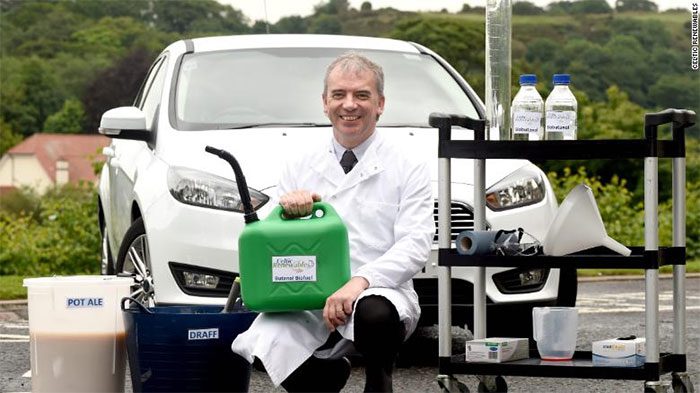Every second, approximately 44 bottles of whisky are exported from Scotland to various countries around the world. Whisky has become the most internationally traded spirit globally, generating an export revenue of $5.9 billion just last year.
However, each liter of whisky produces a significant amount of waste: around 2.5 kg of solid by-products, 8 liters of liquid distillation waste, and 10 liters of used wastewater. According to statistics from Zero Waste Scotland, this amounts to 684,000 tons of solid by-products and over 2.3 billion liters of distillation waste each year. A portion of this waste is used as animal feed, while the remainder is either landfilled or discharged into rivers and oceans.

Scientist Martin Tangney with biofuel produced from whisky. (Photo: CNN).
Recently, a biofuel scientist came up with an innovative idea to recycle this waste. Martin Tangney, the founder of Celtic Renewables, has utilized a fermentation process to convert whisky by-products into biochemical substances that can replace gasoline and diesel for cars, as well as substitute other petroleum products.
Biofuels are not a new concept. In the late 1800s, Rudolph Diesel experimented with soybean oil as fuel for his engine. In the 1930s, Henry Ford, the founder of the Ford Motor Company, regarded plant-based ethanol as the “fuel of the future.” However, growing crops can be relatively expensive, while oil remains a cheaper alternative.
Tangney’s goal is to find an affordable material to make biofuels more commercially viable and sustainable.
In 2011, Tangney established the startup Celtic Renewables. Celtic Renewables employs a fermentation process known as acetone-butanol-ethanol (ABE), where bacteria break down sugars in whisky distillation waste into acids. These acids are further decomposed into solvents such as butanol and ethanol, which can be blended with gasoline or diesel. Celtic Renewables has tested this fuel with a Ford vehicle running on gasoline containing 15% biobutanol derived from whisky.
Tangney notes that his fermentation technology is not limited to whisky by-products but can also utilize waste from other food industries. The inventor points out that solvents produced from fermentation can replace oil in plastics, cosmetics, pharmaceuticals, clothing, and electronic devices.
Biofuels made from renewable organic materials like corn, soybeans, or sugarcane are often promoted as an alternative to fossil fuels. However, their production typically requires a significant amount of land, which can undermine the benefits of reducing greenhouse gas emissions.
Alison Smith, a senior researcher at the Oxford University School of Reform, warns that when aviation and other industries view biofuels as a quick solution for carbon neutrality, it may lead to a “trade-off with significant impacts on biodiversity, carbon storage, and food security” depending on the raw materials used. Meanwhile, fuels made from “waste feedstocks” like whisky by-products are considered the “best type of biofuel” as they do not encounter these issues.
Currently, there are vehicles running on whisky around Scotland. The Glenfiddich distillery of William Grant & Sons uses biofuel produced on-site from whisky by-products to power some of its trucks, reducing carbon emissions by 90%.
Celtic Renewables has raised over $52 million, supported by private investors, government grants, and community funding.
Last year, the company built Scotland’s first bio-refinery, with the capacity to convert 50,000 tons of whisky by-products into biochemical substances. Tangney stated that the plant is expected to operate at full capacity by the end of this year after completion of testing.


















































